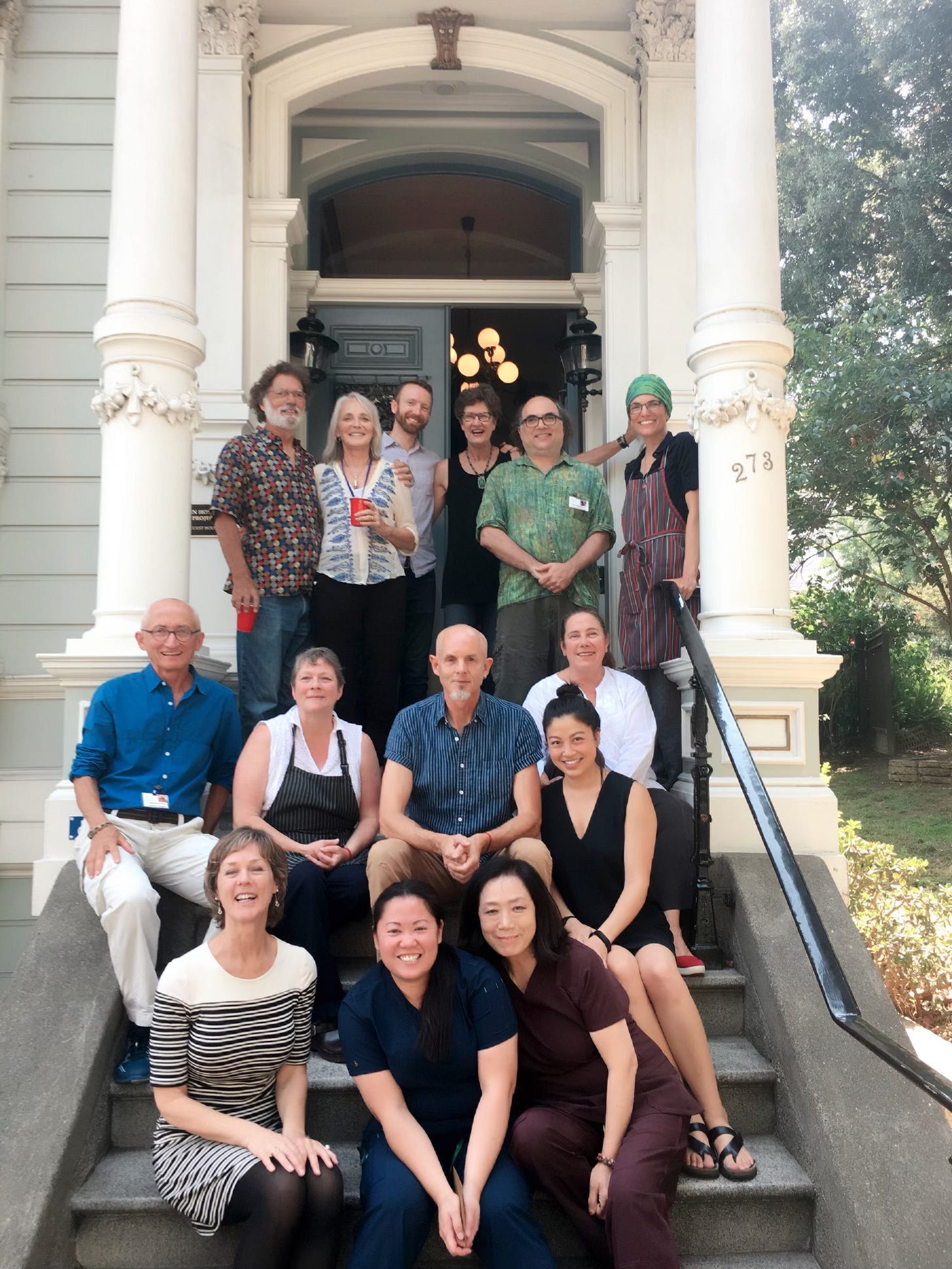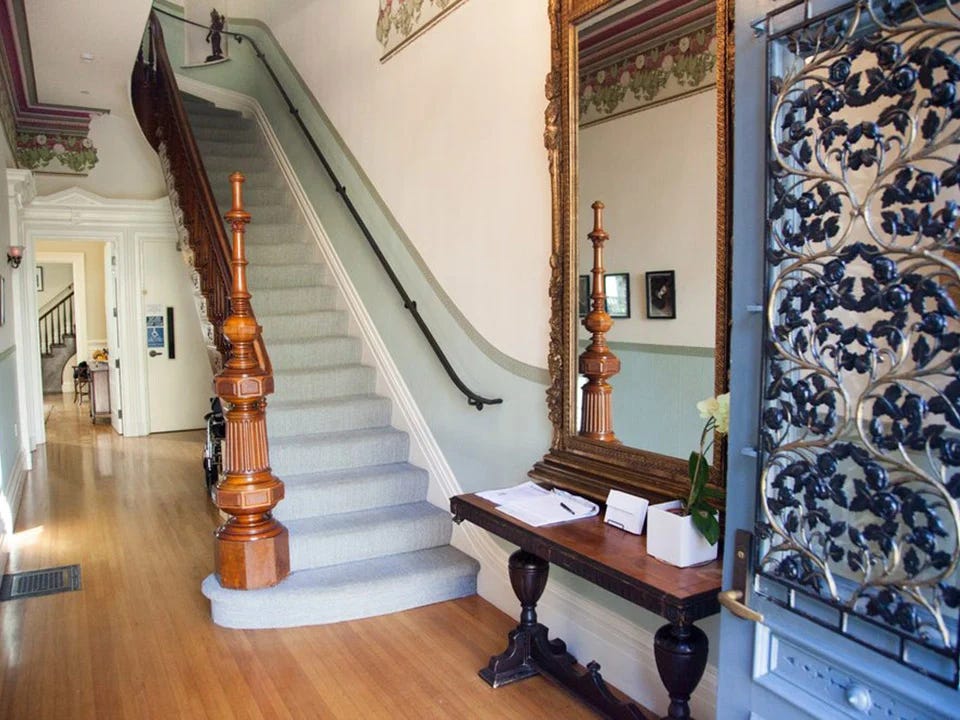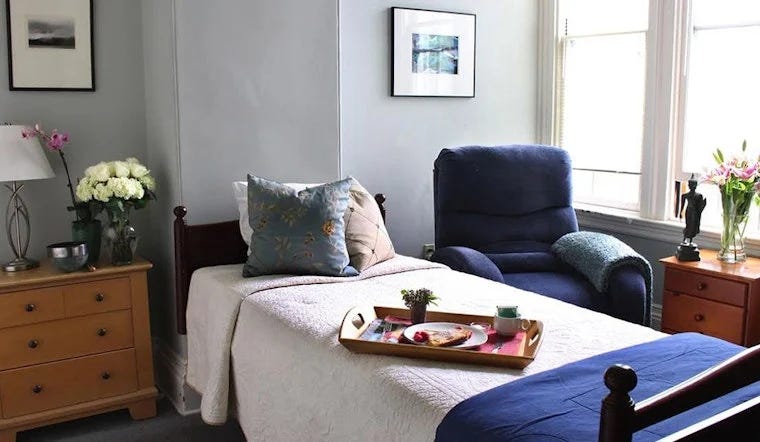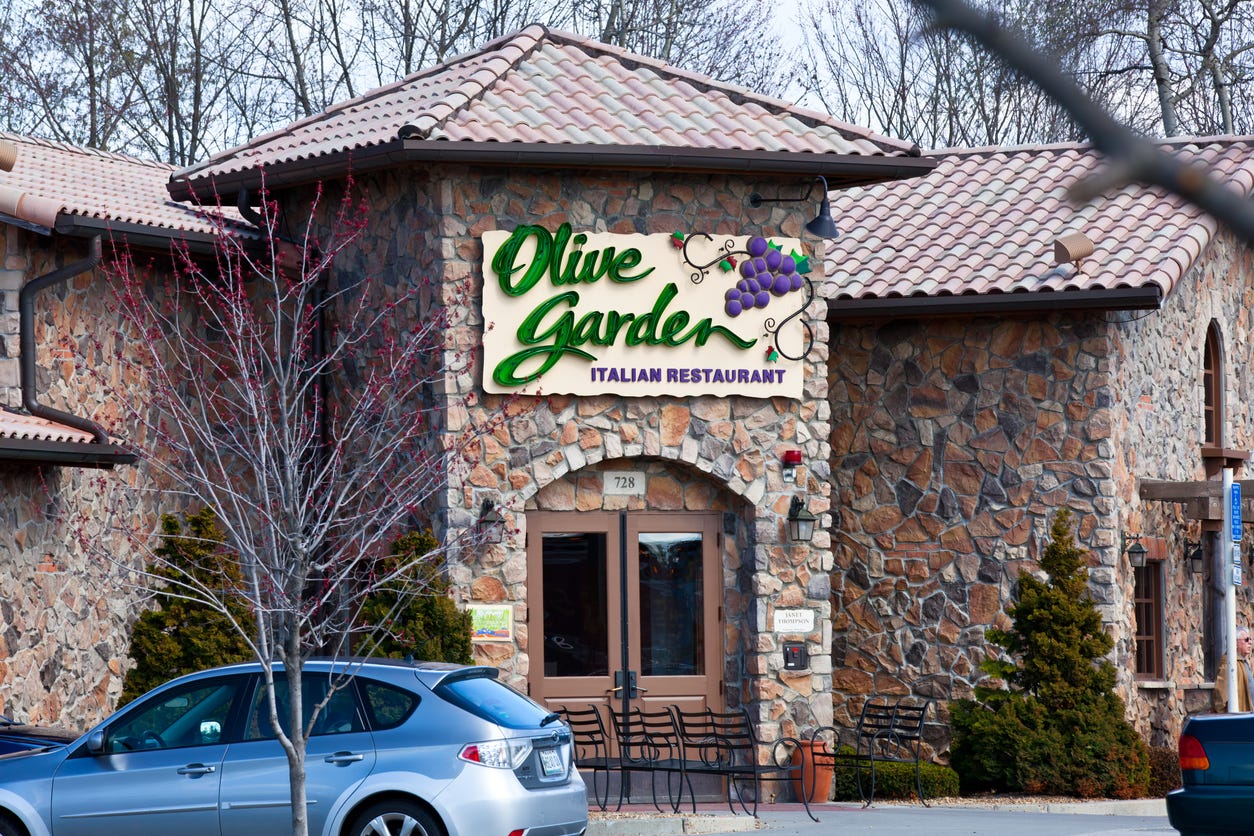
“There are two things you need to know about me,” Beth said. “One is that my doctor has given me six days to live. The other is that, in the time remaining to me, I need to get two things done: find a loving home for my dog, and kick my ex-husband’s ass in court.”
We were facing each other at the front door of the Guest House of the Zen Hospice Project, in San Francisco’s Hayes Valley. I was on my Friday-afternoon shift as a volunteer at the hospice, and Beth — a 59-year-old woman (I’ve changed her name) — was standing before me on the stoop, ready to check herself in, flanked by a battered suitcase and a scruffy little dog with one ear. I remembered wondering many things, including why the dog had only one ear. Maybe he had an artistic temperament?
At that point Beth was still strong enough to get up the stairs to the second floor on her own power — which saved us some time, as the tiny elevator (like many other things in this underfunded hospice) was frequently broken, and even on its best days moved at a rather meditative pace.
All six of the beds in the Guest House were on the second floor. Earlier in the hospice’s life, as the AIDS crisis was first emerging, there hadn’t even been an elevator. Sick young men from the nearby Castro neighborhood, having heard that there was this place where you could just show up and be lovingly cared for, would be carried up the stairs by volunteers.
I showed Beth into a room at the end of the hallway facing Page Street. It contained Bed No. 1, funded by an anonymous donor and reserved for people who were destitute. Beth took her few belongings out of her suitcase, including Julia Child’s Mastering the Art of French Cooking, which she put on a bookshelf. Her dog ran around the room sniffing things.
“He’s a rescue dog from New Orleans,” Beth told me. “Found after Hurricane Katrina. He had a dog tag in the shape of Texas, but his name on it was no longer legible — so the rescuers just ended up calling him ‘Austin.’”
Later I showed Beth around the Guest House. On the ground floor, off a hallway, were the magnificent Great Room, where we volunteers had our shift-change meetings, and the dining room. Further back was the kitchen, which was really the heart of this institution. Amazing chefs were constantly cooking incredible food for the residents (we didn’t call them “patients”); as you moved about the second floor, you’d smell whatever delicious dish was being prepared downstairs.
Eventually, I took her out to the lovely garden at the rear of the house and we sat down on a bench. With great wit and zest, Beth gave me a condensed account of her life. After attending Cal-Berkeley, she had gone off to New York to be a dancer — but had eventually given up dancing and come back to the West Coast. She’d married a very rich man, and they had a grand home on San Francisco’s Pacific Coast, where they would sometimes host political fundraisers. But the marriage had ended bitterly, and she’d lost nearly everything in the divorce settlement — all she was left with was an apartment in Manhattan, and her ex had sued to challenge her claim of ownership. Then she got breast cancer, which metastasized — at which point doctors had given her only months to live. And yet she had persisted for years, through frequent hospitalizations and a great deal of pain. Her last stop before coming to the Guest House was at a facility for homeless women. And just recently, a doctor had told her she was finally approaching the end of her life — and she’d been accepted at the Zen Hospice Project, where she could spend her remaining days.
“But tell me about you, Josh!” she said.
That’s a dangerous thing to say to an autobiographical monologuist! Fortunately for her, it was near the end of my volunteer shift, so I kept my response relatively brief. When Beth heard that I’d been raised by communists, she lit up, saying, “I’m a red diaper baby, too!” We happily sang “The Internationale” together. I told her that I was almost 55, an age I’d been dreading, as my dear father, Paul, had been 55 when he had the devastating stroke that had eventually killed him. That number had taken on a talismanic power for me: it represented to me the dreaded finiteness of life — my dad’s, my own, everybody’s.
We were sitting by the open windows of the kitchen, and enticing smells were wafting out to us.
“You know, Josh,” Beth said, “if I could start all over again I’d become a chef — a saucier.” She explained how she was temperamentally unsuited to be a baker, which required precise measurements. But a sauce-maker, she said, could improvise to her heart’s content.
It was now time for my shift-change meeting. I felt so sad to be leaving Beth! I found her absolutely delightful and compelling, and kept thinking about how she’d been given only six days to live. When I came back a week later, would she still be there?
All week I dreaded checking my email inbox, in case there might be a notification from the hospice that she had died. But the next Friday, when I began my shift on the second floor, there she was!
I stood in the doorway to her room. Beth was in bed, happily leafing through Mastering the Art of French Cooking, with Austin dozing on her lap.
“Beth, you’re still here!” I blurted out.
“I know!” she said. “Josh, believe me — I’m as surprised as you are! But it’s a good thing, because my ex-husband’s court case still hasn’t been decided.”
Beth was giddy at still being alive — and despite her weakening condition, she was able to walk Austin around the neighborhood; I accompanied her. That morning she’d been taken to the hospital so they could drain out the excess fluid that built up internally because of her cancer. As we labored up a steep hill, we sang “The Volga Boat Song,” which had been Dad’s and my “uphill song” when I was a boy.
We got back to the Guest House just in time for my shift-change meeting. Saying goodbye to residents at the end of a shift had initially been awkward for me. What do you say: “See you next time”? You hope beyond hope that they’ll still be there when you return, but I’d learned from our remarkable supervisor of volunteers, Roy (a former volunteer himself), not to lie, not to offer fantasies, to be real. I gave Beth a hug, scratched Austin on the tummy, and simply said, “Well, bye.”
The next week she was still there — noticeably weaker, but still in good spirits.
I sat by her bed, and after we’d caught each other up on our week, Beth said: “Josh, I have a confession to make. I know I always make a big deal out of how much I love fancy food — but there’s one place I want to go back to before I die, and given how I keep hanging on here I’m daring to dream that this might actually be possible. It’s kind of embarrassing, okay? But I want to go back, one last time, to the Olive Garden at the Stonestown Mall.”
This took me aback. I’d never been to an Olive Garden restaurant, but I remembered watching the TV ads, and the place didn’t seem that — how do I put this? — authentic.
I mean, Dad and I used to eat at the cheapest places — automats, Chock Full o’Nuts — but they never tried to seem like something they weren’t.
“Look,” Beth said, “back when I was in that miserable marriage, practically the only times I ever felt some peace were when I went alone to the Olive Garden for their lunch special.”
"What’s so special about their lunch special?” I asked.
“Well, for one thing, it’s dirt cheap,” she said, showing me a newspaper ad she’d been gazing at — at the bottom of which were the words, in big, bold all-caps: LUNCH SPECIAL ENDS AT 4 P.M. “But mostly it’s the bottomless bowl of salad.”
“‘Bottomless’? Does that mean that when you finish a bowl, you can just get up, go back to the salad bar, and refill it?”
Beth looked at me with a kindly sort of pity (I get that a lot). “Oh no, Josh! You don’t have to get up. You never have to get up. The waiter comes over and just refills it for you. And the vinaigrette is excellent! Plus, the lettuce is so crisp.”
Crisp. Could she possibly mean that they actually used iceberg lettuce?! This filled me with a wild surmise. Because as a child, for what seemed like years and years, I had been denied access to iceberg lettuce — which, at the time, was the only kind of lettuce I knew about. That’s because our family was honoring the United Farm Workers boycott — the same reason I missed out on table grapes for an extended period. When I was in high school in the 1970s, I went on a trip to the Soviet Union. Two other red diaper babies were traveling with me — and when we came across grapes at a farmers’ market, and realized that the UFW boycott didn’t need to be honored there, we wolfed down so many of them that we all got sick.
Unfortunately, iceberg lettuce is kind of a sore spot in my adopted hometown of Berkeley, where it is generally frowned upon — considered less a food than a kind of packing material. Once, when I asked at the Berkeley Bowl supermarket where I might find some iceberg lettuce, I was afraid they might have security escort me out.
She confirmed that the salad did, indeed, contain iceberg lettuce.
“Beth,” I said, “we must go to this Olive Garden!”
But could we go? She was very sick, of course — unable, by this point, to walk Austin herself (we volunteers took turns). I checked with the awesome nurses on the floor, Young and Grace, who were thrilled that Beth was motivated to go on this adventure. They told me they’d put together a baggie of her meds, for us to bring with us. My shiftmate, Lisa, told me she’d make sure to bring her car the next Friday, so she could drive Beth and me to the Stonestown Mall (I’m one of those non-drivers from New York). Roy said it would be okay to take Beth out for a couple of hours, so long as Lisa and I weren’t urgently needed to help out any other residents. When I parted with Beth at the end of my shift, she and I were both beside ourselves with excitement for our planned outing in a week’s time. Unspoken, as always, was the question of whether she’d still be here.
The next Friday, even before my shift change, I ran up to the second floor to check with Young and Grace.
“How’s Beth?” I said.
“Oh, she can’t wait to go to the Olive Garden,” Grace said. “It’s all she’s been talking about!” Young and Grace had bathed her and fussed over her, and someone had loaned her a nice dress to wear. The excitement about this upcoming adventure had spread to the rest of the staff and even some of the other residents. My shiftmate Lisa had gone to the trouble of giving her car a deep cleaning for the big trip.
All during shift change, back downstairs in the Great Room, I was daydreaming about how wonderful it would be to fulfill Beth’s wish.
But when I went up to Beth’s room and saw the devastated expression on her face, I knew something had gone terribly wrong.
She was holding the hospice’s iPad, frowning at an email she’d just received. She showed it to me. It was from her lawyer, telling her that her ex-husband had won the court case. And not only was the judge making her give up the apartment in Manhattan; if she didn’t sign and return the attached document by the end of that business day, promising to abide by the ruling, an additional penalty would be tacked on: she’d owe her ex $10,000 to reimburse him for the rent he could have been charging people while Beth was claiming ownership. Which was roughly $10,000 more than she possessed.
As Beth dealt with with her rage and frustration, I raced around the Guest House grounds, trying to find a working printer so we could make a hard copy of the legal document for her to sign. Time was of the essence: it was almost 3 p.m., and I knew that the Olive Garden lunch special would END AT 4 P.M. I finally got the damn thing printed out by 3:20 or so — but as I hurried through the second-floor hallway to bring it to Beth, I noticed a commotion in the next room. Poking my head in, I saw that a newly admitted resident was going into serious spasms, and because his hospital bed lacked a railing (the hospice couldn’t afford a replacement), my shiftmate Lisa had to sit nearby, ready to protect him in case he accidentally launched himself out of bed.
“I won’t be able to drive Beth until Roy comes back!” Lisa said.
“Where’s Roy?” I asked.
“He’s across the street getting a sandwich.”
This was the worst possible place he could be! Because the sandwich shop across the street took forever to make a sandwich. My theory was that it was staffed entirely by Buddhist students from the San Francisco Zen Center down the block. They didn’t so much make a sandwich as they allowed themselves to be present with the ingredients: it would get made according to the rhythms and desires of the Universal Spirit.
It was now 3:40 — and Roy had to come back with his sandwich and take over care of the spasming patient before Lisa could drive us to the Stonestown Mall.
For several tense minutes we waited for Roy to return — me, Beth, Lisa, the nurses. Finally we heard him enter downstairs.
“Roy,” I yelled, “we need you up here right away!”
“But I have to eat my sandwich!” Roy yelled back. He is a vegan and has approximately zero percent body fat — so, like a hummingbird, he must eat constantly to stay alive.
This delay was just too much for nurse Young. I had never seen her lose her composure — not once. But now she shouted down the stairs: “Roy! Hurry! Roy! Please! Roy! Time is running out!”
Which is quite a thing to yell at a hospice.
At last Roy, still clutching the remaining half of his sandwich, came staggering up the stairs and quickly took Lisa’s place at the bedside of the new resident.
Beth had signed the document, and a scan of it had been emailed to her lawyer.
It was 3:55 — not enough time for us to make it to the Stonestown Mall before 4.
I called the Olive Garden.
A cheerful-sounding woman answered. “Ciao! Olive Garden!” she said.
Oh, so the place was authentic, after all!
Speaking with great urgency, I explained to her that I was a volunteer at a hospice and a dying resident's last wish was to have the lunch special at the Olive Garden. But we wouldn’t be able to get there until a bit after 4. Could we still have the lunch special?
“Oh, no!” the woman said brightly. “Here at the Olive Garden, the lunch special ENDS AT 4 P.M.”
I was about to demand to speak to her manager — you know, “Let me talk to Mr. Olive!!” But then I saw the look on Beth’s face. She was getting her terrible breakthrough pains, which often assailed her in the late afternoon. These would make going out unendurable for her.
I ended the phone call.
For a few long moments, all of us were quiet.
Finally I said, “Hey, we’ll go there next Friday.” But I could see in Beth’s eyes the same thing I was wondering: would she make it till then?
The next Friday, when I showed up for my shift, Young and Grace told me that Beth had really been fading. When I went to her room, she was lying in bed, her eyes shut.
“Beth?” I whispered.
She opened her eyes.
“Are you up for going to the Olive Garden?” I asked.
She looked confused for a few moments, but then it all came back to her.
With a big smile, she said, “Oh yes, Josh!”
While the nurses got her ready and put together her meds for me to bring, Lisa went and got her car from where it was parked a couple of blocks away.
I offered to get the wheelchair for Beth from downstairs, but she insisted on walking. With her leaning heavily on my arm, we made our way to the tiny elevator and took a slow, bumpy ride down to the ground floor. Then we went out through the backyard to the rear exit, where Lisa was double-parked nearby, waiting for us.
I helped Beth into the backseat and got into the passenger’s side in the front, and we headed off — with Beth giving Lisa turn-by-turn directions to the Stonestown Mall.
Finally we arrived at the Olive Garden — and dear readers, it was everything I’d dreamed it would be: metastasized capitalism, in all its glory!
The maître d' (fancy!) offered to show us to a table, but Beth just led us to the nearest booth.
“This is as far as I could go!” she confided to me, breathing heavily, as she, Lisa, and I settled in.
A waiter came by with laminated menus. Beth waved them away.
“We know what we want,” she said.
A mere minutes later, we were presented with three enormous chilled-glass bowls of salad.
It was glorious! Crispy iceberg lettuce! Scrumptious vinaigrette! And all the fixings!
And as each of us finished our first bowl, lo, just as had been foretold, the waiter magically appeared to refill it.
The iced teas were tasty, too. I may have gone a little too crazy with the breadsticks.
Throughout the meal, Beth kept asking Lisa for more details about Lisa’s wedding, which was happening the next weekend. I was struck by Beth’s intense interest. After all, she was very near the end of her life, while young Lisa was really just beginning her adulthood.
Then I realized: We weren’t two healthy people and one sick person. We weren’t two volunteers and a patient. We were three human beings, together for the lunch special at Olive Garden, enjoying one another’s company.
Between bites, Beth and I took turns explaining to Lisa about dialectical materialism and the revolution we’d been told was inevitable. As we sat in the Olive Garden.
After we were done eating and the waiter had taken away our bowls and brought us the (very reasonable) check, Beth was so happy.
“Oh, Josh,” she said to me, “I’ve actually done it! I’ve made it through the entire meal, and not once did I have to throw up or have to go to the bathroom!”
Which I think they should put in their ads. I mean, it’s better than anything you can find about the Olive Garden on Yelp.
Beth would end up living for a few more weeks — even making it just past her 60th birthday. One of the volunteers adopted Austin.
I can still remember how I felt as I sat in that booth with Beth and Lisa after we handed the waiter our check. I no longer feared or even resisted finiteness. Not at all.
I’m finite. You’re finite. We are all finite.
But the bowl — the bowl is bottomless.







Gawdamighty, you've outdone yourself again! What a story! Blessed art thou (and fellow workers/volunteers) for your hospice service!
Thank you - I'm crying and full of hope and joy! Peace, ck